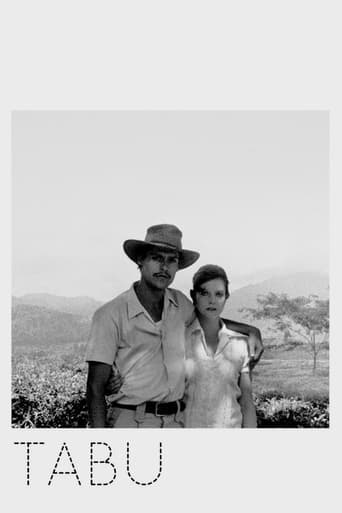



Save your money for something good and enjoyable
Intense, gripping, stylish and poignant
Excellent, a Must See
It is interesting even when nothing much happens, which is for most of its 3-hour running time. Read full review
View MoreWho wants to see a film that's shot in black and white, is slow moving and its second part is like a silent film? If the answer is yes then you will be richly rewarded with Tabu. The Portuguese director Miguel Gomes has made a strange poetic film. A Portuguese film in two parts "Paradise Lost" and "Paradise." The bizarre short prologue transports us to a strange world where an intrepid explorer mourning a lost love gets eaten by a melancholic crocodile in Africa. The crocodile reappears throughout Tabu and accept for concluding that it represents an ancient old soul looking over the proceedings I'm not sure of its significance. The first part is set in modern Lisbon which appears to be full of bland apartment blocks. It explores the relationship between the kind melancholic Pilar (Teresa Madruga) and her gambling addicted; fading neighbor Aurora (Laura Soveral) who has a tendency to exaggerate and get lost in her vivid imagination Aurora is having problems with her housekeeper Santa (Isabel Cardoso). She believes Santa has turned her daughter against her with her black witchcraft. In between rescuing Aurora from the casino, Pilar goes to the cinema, joins the UN protests and shares time with her romantic painter man friend. The health decline of Aurora triggers the death bed request to see Gian Luca Ventura (Henrique Espírito Santo). Over coffee Gian shares another story of Aurora back in deepest darkest Africa. We are transported back to another time and the film takes on another feel, romantic and sensual. Gomes referencing Sydney Pollack's epic romance Out of Africa begins the story with the immortal lines, "She had a farm in Africa." This part is without dialogue but features a finely scripted voice-over and the sounds of Africa. This section melodramatic and dreamlike details the doomed love affair between Aurora (Ana Moreira), and the seductive adventurer Gian (Carlota Cotta). Cotta looks and is framed like a silent film star, Moreira more like a star of French cinema of the sixties. In between the all-encompassing romance of the privileged whites the Africans toil away, in the fields, as servants, basically second class citizens. Throughout the film Gomes intentionally positions the whites as the ruling class whilst the blacks struggle to be heard. Yet this is never over emphasized.Gomes has crafted a film that stays with you. Those moments in time A solitary tear awkwardly swiped away by the elder Gian recalling the loss of great love, the stony faced Santa eating the prawns given to her by the annoyingly kind Pilar, the first meeting of the young lovers almost unable to hide their attraction for each other, the bizarre performance of the boy band at the pool house. The performers are all excellent and Rui Pocas does a great job with the black and white cinematography.
View MoreI watched Tabu knowing very little about it and found the film a real treat to watch, but however I will try to avoid giving too much away as this is one of those films that are best to watch not knowing too much. The whole viewing experience is very rewarding, not just emotionally, but also in that your required patience is amply rewarded. Though the entire film is shot in black and white, the two different stories are told in differing stylistic ways, making Tabu a very fitting tribute to cinema itself. The first half, firstly being set in the present day, has almost a surrealist feel to it, with some apparently random moments and new characters being introduced suddenly. This does require your attention and anyone could be forgiven for wondering where the hell the film is going. However, as the first half reaches its inevitable conclusion and we enter the second half, this is where Tabu becomes an engaging and emotionally rewarding film. Many of the supposedly random moments of the first half now fit in perfectly as we are revealed what happened when Aurora was a young woman living in Africa. The second half is a rather simple story of an illicit love affair that could never be but is told in an emotionally powerful way, enhanced by the framed narrative structure and deeply mournful narration of who we discover to be the man she loved. The power of the voice over is enhanced by the completely different stylistic approach of the second half, the only dialogue throughout is the voice over of Aurora's lover and the whole second half is shot in 16mm. The poignant reflections of the narrator can easily be interpreted as also being the director's and perhaps us the viewer's feelings towards silent era cinema of a bygone age. This stylistic approach is very much purposeful, all other diagetic sounds can be heard, and the characters are physically talking to each other. The emotional power is only enhanced by the fact all we can hear is the non-diagetic narration and having to otherwise rely on expressions and body language of the characters. Part two feels like a two sided approach to love of the past; a past loved one and a love of cinema of the past.Despite the main subject of the story at hand, Tabu is not a completely bleak film, the playful use of different cinematic techniques and music are a joy to watch and the catharsis of the ending leaves a feeling of poignancy but not abject misery. There are however elements to Tabu that may frustrate. It feels that the protagonist of part one is Pilar, Aurora's neighbour and her story does feel frustratingly unfinished as we see elements of her daily life that make us truly care about her as these moments have literally nothing to do with Aurora. However, this is the story of Aurora through the eyes of those around her and in that case the stylistic approach of part one in retrospect fits with that of part two. The surrealist and playful approach to narrative structure in part one may seem pretentious and potentially alienating to some, but after watching the entire film I could only look back at it with positive feelings. Original and unique, Tabu is a thoroughly engrossing and emotionally rewarding story that serves not only as a tribute to human love, but also love of the history of cinema. The first thirty minutes or so may feel hard work at first, but what the remainder of the film has to offer more than amply rewards the viewer's patience.
View MoreI always loved voice-overs in films. Almost as much as I hated all attempts of realism in films.So called "reality" is the worst kind of delusion. It makes us feel that we have time when in truth there is not time. It binds us to the moment and makes us blind to what it means. A story can reveal tragedy but when you are in the midst of it, in the "reality" of it, you only see that "reality" which makes everything trivial.That's the magic of the voice-over. You see everything happening as in "reality" but the voice-over pulls you back and the reveals the greater truth, the story.In this film, this is cleverly utilized. The story is banal for sure but the voice-over reveals that what was conceived as "real" was only a dream. This film stays in the voice-over and shows how most of our talk is just blabber and not necessary to understand what is going on. In the second part of the film, which is the part in which the voice-over takes over, there is no dialogue to be heard and I, as the viewer, could not be more happy about it. The paradise, which is the title of this second half of the film, is, to me, the blessing of not having to hear the blabber. All other sounds are revealed and the director makes a point out of it. These sounds do not disrupt the magic. Only the blabber would do that and bring forth the trivial.
View MoreA KVIFF viewing, the third feature-length work from Portuguese director Miguel Gomes, which was among the contenders for the Golden Bear in Berlin earlier this year, and wound up winning the FIPRESCI Prize and Alfred Bauer Award.The film is entirely in Black & White, which has a deceiving anachronism effect and injects an appeasing vigor to enliven the storyline. With being equally divided into two parts, the first half is the contemporary story between a middle-aged woman, Pillar and her senior neighbor Aurora (who is live alone with her black servant Santa, and strongly believes her estranged daughter and Santa are plotting against her); the second half is completely B&W silent, with an elaborate voice-over from Aurora's former lover Ventura, revealing a secret history about he and Aurora's love affair back in Africa half an century ago. It is a distinctively interesting composition, which contributes a pleasant illusion that we were watching a double-feature.But by comparison, the first part is more austere and compelling while the second part is basically about a superfluously hackneyed liaison between a married woman and a romantic womanizer, the only worthiness is that it is between two white people in Africa, and if one intends to get some in-depth probe about the continent and its people, the film could hardly suffices this curiosity. Between the female correlation in the first part, Pilar has a manifest momentum to propel the storyline, and ruefully there will not be a third paragraph to recount her story out of the lightly over-hyped second part, her story behind might own more worth to be revisited and explored. Teresa Madruga and Laura Soveral are spellbinding during their screen time, if only the second half could be reinterpreted in another way, the film could have been a fabulous essay about love, aging and mystery behind everyone's usual representation.
View More